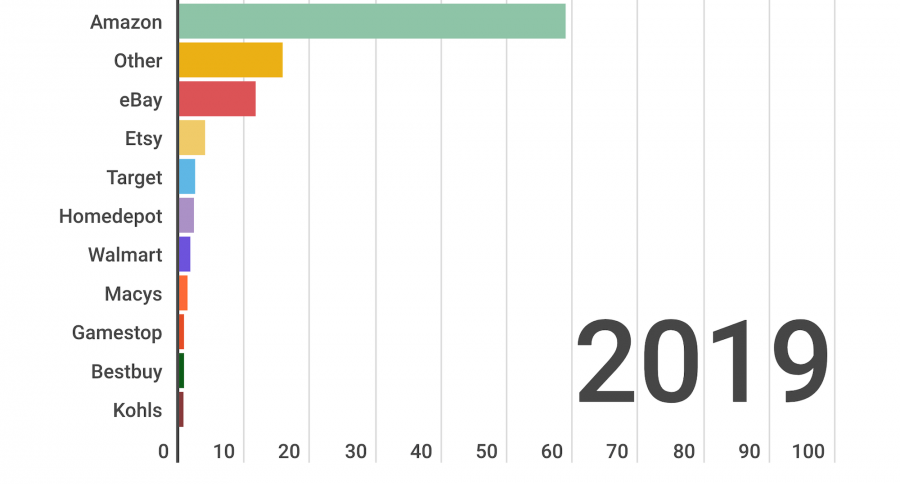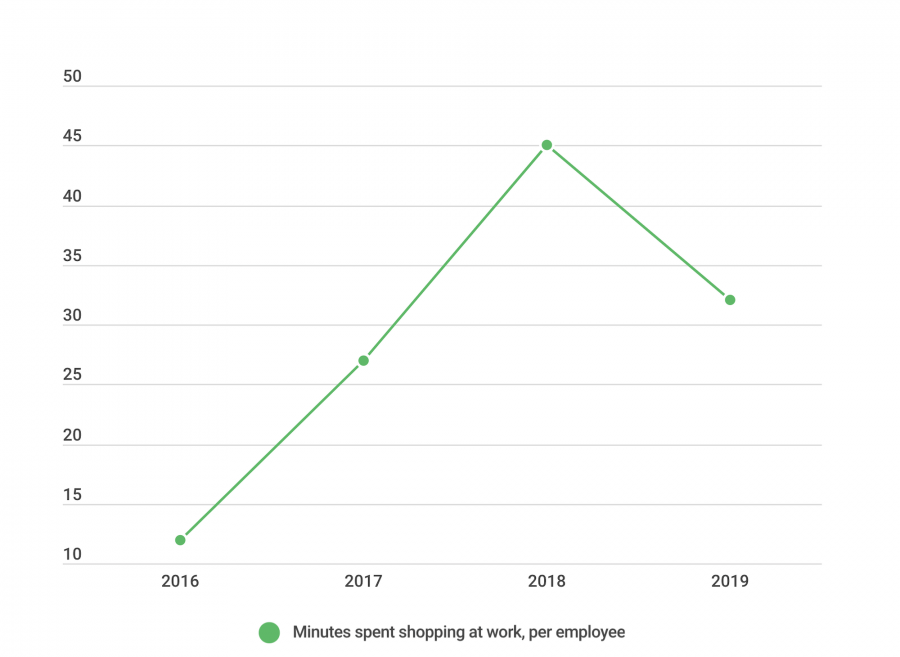Encouraging your employees to shop during work hours sounds odd, to put it mildly. But armed with some data, I’m willing to explain why it’s not quite like kicking yourself or throwing your money in the air.
You should not only allow employees to do personal shopping at work. You should be happy when they do it. As the founder of the time tracking app DeskTime, I’ve always been passionate about productivity. But I’ve often found it to be misunderstood by staff and managers.
On the DeskTime app, we’ve labeled sites and applications ”productive” or ”unproductive”. But are the unproductive ones really harmful to our team’s overall performance? Or, are they a distraction that’s sometimes welcome and even necessary?
That’s why we decided to look at a supposedly unproductive activity – online shopping during office hours.
Employees spend more than half an hour a day in online shopping.
Many studies confirm what you may have already suspected to be true – most people engage in online shopping at work. When you look at millennials, 81 percent of them browse shopping sites during work hours.
We decided to have a closer look at this phenomenon, so we gathered data from more than 180K users of our app. We pulled data concerning the use of online shopping sites over the last four years.
First of all, we confirmed that office workers indeed use online shopping to procrastinate during work hours. We noticed that online shopping at work is a growing trend.
Let me explain:
In 2016, an average DeskTime user spent only up to 12 minutes a day on online shopping, but a year later, this number more than doubled. In 2018, an average office worker was already spending up to 45 minutes a day shopping. Last year, however, the trend seems to have slowed down with 32 minutes dedicated to online shopping per day.
That being said, despite the slight changes in online shopping dynamics we observed last year, I still believe those office workers from all over the world will continue to flock to the Internet to make purchases. It wouldn’t be a surprise if the total time spent on online shopping during work hours would increase again in 2020 along with the entire e-commerce market, which is also continuously growing.
Where do employees shop the most during office hours?
When it comes to online shopping destinations, Amazon remains the most popular e-commerce site visited during office hours. In 2019, people spent almost 60 percent of all time dedicated to online shopping browsing Amazon. The runner-up is eBay with 11.6 percent and Etsy with 4 percent ranking third.

So, if you weren’t sure that your employees shopped during work hours, now you should be. From now on, it’s up to you whether you let them do it openly or whether you’d prefer them to sneak around.
Let me explain why I think transparency is the best policy here and why you should not mind your team doing some shopping at work.
1: Online shopping is one of the least harmful unproductive activities
Online shopping is far from being the biggest productivity threat to companies. So, before you block all e-commerce websites in the office or fire someone for browsing Amazon at work, reflect on this:
Only about 3.8 percent of the unproductive time is spent on shopping, according to the data.
In the meantime, social media and video streaming websites (such as YouTube and Netflix) take up 49 percent and 35 percent, respectively.
2: Shopping makes employees happier
Numerous studies point out that the use of social media can cause depression and anxiety. On the contrary, shopping has been found to promote the release of dopamine – a hormone that plays a vital role in how happy we feel.
A distraction like shopping lets employees takes a mental break. And happy employees are found to be more productive and efficient. Also, people who aren’t policed and restricted at work are less likely to search for another job.
When you look at it that way, allowing your employees to buy some new gadget or a piece of clothing during working hours doesn’t sound like such a big deal, does it? Certainly not if it can boost morale and reduce employee turnover.
3: Shopping at work can actually make people more productive
Imagine yourself in a situation where you just did some shopping during work hours. How do you feel?
Are you satisfied that you’ve saved some of your private time? Guilty for abandoning your work duties for a while?
Probably a bit of both. I guess that this combination of happiness and guilt can give a productivity boost to many people.
Studies prove that employees’ productivity soars after short breaks. And psychologists claim that giving your brain a short rest can help you stay focused on the task at hand.
Ideally, you should encourage taking breaks away from the computer so that your employees rest their eyes, stretch, walk around, and drink some water. However, if a mental break is what they need at that moment, let it be.
Key takeaway?
A modern workplace should put a focus on employee performance rather than on counting the minutes spent on productive or unproductive activities. And you heard that from me, the founder of a time tracking app.
Instead of restricting personal shopping in the workplace, consider starting an initiative where each employee can spend up to 30 minutes a day on settling personal business at work.
Remember – intrinsic motivation is a crucial player in a company’s overall productivity and in reducing employee turnover. Trusting your employees and giving them a break is a more significant motivation booster than you might think.
Image Credit: Andrea Piacquadio; Pexels
Try Out Productivity Tools We Are Using
Monday.com | Best Productivity and Management Tool | on Monday.com | |
Calendar.com | Best Calendar and Scheduling Tool | on Calendar.com | |
Later.com | Best Social Media Scheduling Tool | on Later.com | |
Todoist.com | Best Time Management Tool | on Todoist.com | |
Toggl.com | Best Value Tool | on Toggl.com | |
Trello.com | Best Overall Tool | on Trello.com |



















